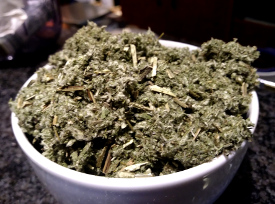Mugwort

Mugwort (Artemisia vulgaris) can be found in Europe, Africa and parts of Asia. The herb enjoys nitrogen-rich, loamy soils, that are slightly alkaline. A tall shrub-like perennial plant of the sunflower family. It has purple angular stems, and can grow up to 5 feet.
TIDBIT: Native Americans equated mugwort with witchcraft, as well as believing if applied to the skin, the individual would be able to ward off evil spirits.
Mugwort has been known to improve overall gut health, starting with gas and flatulence. The herb also aids in the relief of bloating and constipation, as well as cramping and diarrhea. Staying within the topic of gut health, this versatile little herb can also play a significant role in digestion, through stomach acid regulation and bowel functions.
Mugwort Tea has also been known to aid in women’s cycle issues. Mugwort has been shown to stop heavy flows, and regulate the menstrual cycle. It can also aid in the hot and cold flashes attributed to early stages of menstruation.
Mugwort can also be used a pain reliever, with mild hallucinogenic properties. Known to combat insomnia, these hallucinogenic properties also come into effect whenever sleeping, causing lucid dreaming for some. Also, because of the relaxing effect of the herb, it also has a positive effect when dealing with depression.
TIDBIT: It takes about 2 weeks of consuming mugwort, before the herb begins to take effect whenever dealing with sleeping disorders. Herbalist recommend 2 cups of tea per day.
Precautions for Mugwort:
- Lactating and pregnant women should not ingest this tea.
- People who are allergic to pollen should avoid this tea as well.
Source: https://www.organicfacts.net/health-benefits/herbs-and-spices/mugwort-tea.html

